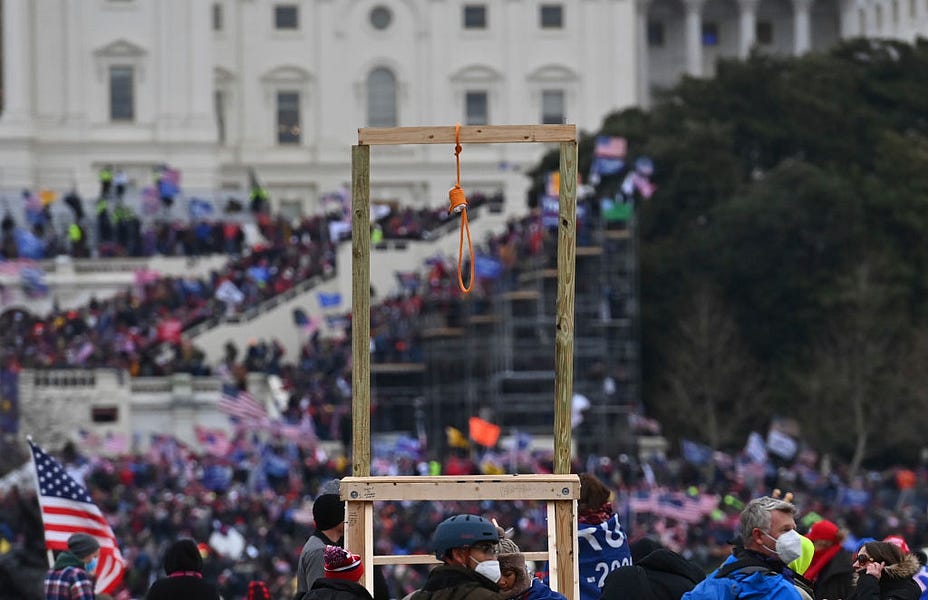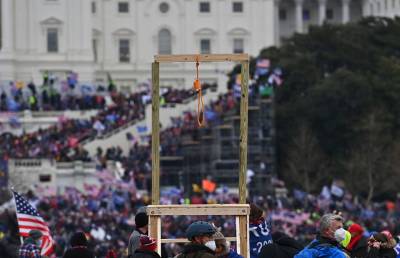This week, the House select committee investigating January 6 will hold public hearings broadcast live in primetime. The committee is expected to focus squarely on the role former President Donald Trump played in the violent attack on the Capitol. Nearly a year and half out from the attack, many of his supporters still deny his role and dismiss criticism of the former president. This includes Rep. Lauren Boebert, who recently tweeted, “Ready for the mean tweets to come back yet?” In this way, Trump supporters often imply there was nothing wrong with Trump or his actions and that opponents are merely overly sensitive to his crude and hyperbolic rhetoric. However, history shows that a leader’s rhetoric can lead to tragedy, and such leadership must not be rewarded. Many members of the mob outside the Capitol, and even members of Congress, referred to the events of the day as their “1776 moment.” But history shows us that Trump’s words and his followers’ actions that day were not in the spirit of 1776. They were reminiscent of another revolution, a much more violent revolution. They did not reflect the ideals of 1776, they echoed the horrors of 1793, and the reign of terror.
In October 1793, Lyons, the second city of France, lay prostrate at the feet of the revolutionary government in Paris. The fighting had been bitter, with revolutionary forces shelling the beleaguered rebel city for two months. In many ways, the capitulation of Lyons represented the high water mark of the dictatorship of Maximillian Robespierre and the Committee of Public Safety. This was an important victory over the domestic enemies of the revolution and moved the government in Paris closer to national consolidation under the tricolor flag. However, this moment of triumph is forever stained with the violence that followed the surrender of Lyons. Liberty and equality may have been the rallying cry, but terror was the order of the day.
Lyons had been a commercial powerhouse before the revolution with a large merchant class built by the success of the city’s international silk industry. The revolution, with its chaotic domestic policy and international isolation, struck at this prosperity and led the city to become a bastion for enemies of the revolution. By May 1793, the city was in open revolt against Paris with royalists and moderate republicans uniting under the shared motto of “peace and freedom without anarchy and violence.”
Five months later, Lyons was brought back into the national fold by force. In response to the fall of Lyons, the Committee of Public Safety, the acting executive authority in Paris, issued the following proclamation: “Lyons made war on Liberty. Lyons is no more.” In addition to this public declaration, the committee instructed the government agents in Lyons as follows:
We will not congratulate you on your success until you have done all that you owe our country. Republics are exacting…Traitors must be unmasked and struck without pity. These principles…may alone save the country… follow them; listen only to the dictates of your own energy, and execute with an inexorable severity the salutary decree which we are addressing to you.
By and through these words, the Reign of Terror arrived in Lyons.
By April 1794, some 2,000 Lyons residents had been put to death in the name of liberty and under the authority of the revolutionary government. Revolutionary tribunals summarily executed with ruthless efficiency those deemed enemies of the revolution. Yet, according to the historian R. R. Palmer, many in the capitol were seemingly shocked when the full extent of the violence was made known to Paris. As Palmer explained in his seminal work, Twelve Who Ruled (1941):
The Committee of Public Safety was caught in this predicament with respect to the slaughter at Lyons. Its members had stated their aims. They had used inflammatory language: “the sword of the law must wave; monsters must be exterminated; a nest of conspirators is not a city…” They had declared grandiosely, without meaning it, “Lyon shall be destroyed…” They did not intend to have two thousand persons killed…or to have a great city pillaged by unscrupulous intruders in the name of public duty. They were surprised when all this happened. Whether they should have been is another question. They were simply taken at their word by men who shared their high-flown phrases but were their inferiors in practical sense and honesty of purpose.
While Palmer may have been overly generous to assume Paris did not intend the punitive massacres, this passage has continued relevance in our own time: Reckless rhetoric leads to terror.
The period known as the Reign of Terror (September 5, 1793, to July 27, 1794) was not limited to Lyons and its 2,000 victims. Across France, 17,000 were officially executed, with another 10,000 dying in prison or without trial. These killings were motivated by a deadly combination of fear, factionalism, and the burgeoning nationalism of France.
The victims at Lyons were among many who suffered due to the reckless rhetoric employed over the course of the French Revolution In September 1792, an enraged mob seized political prisoners from their jail cells and executed them en masse. These remembered as the September Massacres.
In the months and weeks prior to the attack, Jean-Paul Marat, a leading voice of the Revolution and author of the widely read and influential newspaper L’Ami du Peuple (“The Friend of the People”), stoked the fire of popular violence. As late as August 19, 1792, Marat charged all good revolutionaries to “rise and let the blood of traitors flow again. It is the only means of saving the Fatherland.”
Following the September Massacres, apologists claimed that the writer’s violent rhetoric had no bearing on the subsequent violence. Yet, even one of his defenders, a colleague on the Committee of Surveillance, acknowledged the stark consequences of Marat’s words regardless of his personal intent or approval of violence:
With his ardent spirit and lively imagination, always bent upon the same object, is it astonishing that he says extraordinary things? But he would be the first to protect with his own body the most criminal of the aristocrats. He has provoked the most terrible vengeances, but it was to frighten rascals, in order that a salutary fear might turn them from their frightful projects.
Even Marat’s sympathetic biographer, Louis R. Gottschalk, concluded the following in his book, Jean Paul Marat: A Study in Radicalism:
Marat had, of course, time and again urged popular executions. Over and over he had called for preposterously large numbers of heads…Whether Marat meant to be taken at his word or not, the appeal fell upon eager ears, for the people of Paris were already in a frenzy. He must have sensed the situation, and if he did not want to have his words taken at their face value, he was indiscreet to have spoken ... [I]f Marat was responsible for the September Massacres at all, it was only indirectly, through the influence of his well-aired opinions in general and of his call to arms of August 19…That he was a member of the group that was more culpable than any other cannot be denied.
Leaders come in many varieties. Some issue directives from behind a government seal, while others instruct their followers from behind a pen or Twitter handle. Rhetoric is the precursor to action; and reckless rhetoric leads to violent action. Most Americans appreciate this self-evident statement. In a 2019 survey of Americans, a substantial majority (78 percent) responded that they believed heated or aggressive language in politics leads to violence. History confirms this.
On January 4, 2021, Trump rallied his supporters declaring, "If the liberal Democrats take the Senate and the White House—and they’re not taking this White House—we’re going to fight like hell, I’ll tell you right now.” On the day of the assault, Trump told the crowd, “We will never give up; we will never concede. It doesn’t happen. You don’t concede when there is theft involved.” He charged that they were there to “save democracy,” to confront this “egregious assault on our democracy,” and described the nation as “under siege.” Trump’s lieutenant Rudy Giuliani declared the need for “trial by combat.” This rhetoric was not limited to Trump and his immediate circle, it was endemic to those riding the president’s threadbare coattails. Similar rhetoric was shared and repeated, liked and retweeted, across the country. The president’s podium that day charged the crowd to “Save America”, the rallying cry was “Stop the Steal,” therefore, was the result that surprising? To echo R. R. Palmer, the leaders bolstering the events of January 6 “were simply taken at their word by men who shared their high-flown phrases but were their inferiors in practical sense and honesty of purpose.”
We are living in an age when anyone with a social media account or a Substack can influence their fellow Americans. We can no longer pretend as if the vitriol we send downstream from our platform has no collective effect on the health of the nation. This destructive power multiplies exponentially when it is our public leaders pumping out and magnifying the reckless rhetoric. This week, the nation will learn more about the direct and indirect role our leaders played in the events of January 6, 2021. Whether or not Trump or his associates intended the assault is only half of the question. History is full of those who foreswore responsibility for violence, only to find themselves memorialized as the unwitting authors of terror.
Jacob Becker currently serves as assistant general counsel for the Texas A&M University System. He holds a J.D. from Southern Methodist University, where he previously served as assistant general counsel.






Please note that we at The Dispatch hold ourselves, our work, and our commenters to a higher standard than other places on the internet. We welcome comments that foster genuine debate or discussion—including comments critical of us or our work—but responses that include ad hominem attacks on fellow Dispatch members or are intended to stoke fear and anger may be moderated.
With your membership, you only have the ability to comment on The Morning Dispatch articles. Consider upgrading to join the conversation everywhere.